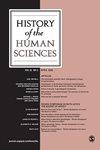面对田野:泰勒关于人类多样性的阿纳瓦克和维多利亚思想
IF 0.5
2区 历史学
Q2 HISTORY & PHILOSOPHY OF SCIENCE
引用次数: 0
摘要
维多利亚时代的人类学家被戏称为“纸上谈兵的人类学家”。然而,他们中的一些人确实踏上了田野。爱德华·伯内特·泰勒的第一部出版作品《阿纳瓦克,即墨西哥与墨西哥人,古代与现代》描述了他年轻时在墨西哥的旅行。泰勒与“田野”的对抗揭示了泰勒对墨西哥社会的不同信仰和态度之间的重大紧张关系。墨西哥的历史(在欧洲人接触之前)和19世纪50年代的现代社会之间的对比,使泰勒看到了墨西哥的进步和退化,既有“真实的”文化,也有深刻的文化混合。为了表明他有能力揭示“真实的”墨西哥社会,泰勒把自己描绘成一个专业的旅行者和民族志学家,尽管他是一个人类学的新手。在泰勒与墨西哥的关系中,身体领域的对抗也造成了紧张。尽管泰勒对外国社会的看法主要是种族中心主义,但他在墨西哥土地和环境中的亲身经历使他在物质文化和社会实践方面走向了一种同理心的相对主义。与此同时,他作为一个旅行者的角色鼓励他将这个领域视为一个流动的实体,没有明确的边界,即使他在文化混合中寻找一个有边界和未被触及的墨西哥社会。从维多利亚时代的旅行者与外国领域的对抗中引出紧张关系,可以让我们更平衡地参与到这些研究人类多样性的维多利亚学者的作品中,这些学者经常被描绘成天真的种族中心主义。本文章由计算机程序翻译,如有差异,请以英文原文为准。
Confronting the field: Tylor's Anahuac and Victorian thought on human diversity
Victorian anthropologists have been nicknamed ‘armchair anthropologists’. Yet some of them did set foot in the field. Edward Burnett Tylor's first published work, Anahuac, or Mexico and the Mexicans, Ancient and Modern, described his youthful travels in Mexico. Tylor's confrontation with the ‘field’ revealed significant tensions between the different beliefs and attitudes that Tylor held towards Mexican society. Contrasts between the evidence of Mexico's history (prior to European contact) and the present-day society of the 1850s led Tylor to see both progress and degeneration in Mexico, both ‘authentic’ culture and deep cultural mixture. In order to show that he was capable of uncovering the ‘authentic’ Mexican society, Tylor portrayed himself as a professional traveller-ethnographer, even though he was an anthropological novice. The embodied confrontation with the physical field also created tensions in Tylor's relationship to Mexico. Despite Tylor's mainly ethnocentric vision of foreign societies, his experiences of physically navigating the Mexican land and environment led him towards an empathetic relativism with respect to material culture and social practice. At the same time, his role as a traveller encouraged him to see the field as a fluid entity with no clear boundaries, even as he searched for a bounded and untouched Mexican society amidst cultural mixture. Drawing out the tensions resulting from a Victorian traveller's confrontation with the foreign field allows for a more balanced engagement with the works of these Victorian scholars of human diversity, which have often been portrayed as naively ethnocentric.
求助全文
通过发布文献求助,成功后即可免费获取论文全文。
去求助
来源期刊

History of the Human Sciences
综合性期刊-科学史与科学哲学
CiteScore
1.60
自引率
11.10%
发文量
31
审稿时长
>12 weeks
期刊介绍:
History of the Human Sciences aims to expand our understanding of the human world through a broad interdisciplinary approach. The journal will bring you critical articles from sociology, psychology, anthropology and politics, and link their interests with those of philosophy, literary criticism, art history, linguistics, psychoanalysis, aesthetics and law.
 求助内容:
求助内容: 应助结果提醒方式:
应助结果提醒方式:


